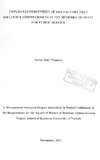| dc.contributor.author | Karia, Jane W | |
| dc.date.accessioned | 2013-03-01T06:41:30Z | |
| dc.date.issued | 2011-11 | |
| dc.identifier.citation | MBA Thesis | en |
| dc.identifier.uri | http://erepository.uonbi.ac.ke:8080/xmlui/handle/123456789/12770 | |
| dc.description | Employees’ perception of the factors that influence empowerment in the Ministry of State for Public Service | en |
| dc.description.abstract | This study was carried out to help management in the Ministry of State for Public Service understands the manner in which it can enhance and facilitate employee empowerment in the ministry. The study sought to establish the extent of and factors that influence employee empowerment in the Ministry of State for Public Service. Employee empowerment has been necessitated by the unprecedented changes taking place in the economic environment requiring managers to be flexible in the way they manage in order to facilitate speedy decision making. Ministry of State for Public Service was chosen as the context of the study as it is the one mandated to provide policy guideline in Human Resource Management and Development in the public service and could be instrumental in the implementation of employee empowerment in the public sector. The study involved 66 respondents from the ministry drawn from all cadres of staff. The data was collected using a structured questionnaire comprising of both closed and open-ended questions administered through self-administered basis. The data was analyzed using factor analysis by use of SPSS software. Descriptive statistics in form of means, std. deviations and percentages are used. The findings of the study revealed that the management in the Ministry of State for Public Service supports and is committed to employee empowerment and individual perceptions are positive towards empowerment. The ministry’s structure, culture and communication channels are all seen to be conducive and supportive to employee empowerment. However some discrepancies in the manner in which employee empowerment is employed exist across different demographic groups and management has been advised to investigate the cause and seek for remedy.
In general the study has been a success and will go a long way in shedding light on how to improve employee empowerment both in public and private sectors. It will also provide insight for further studies on the topic in the future. | en |
| dc.description.sponsorship | University of Nairobi | en |
| dc.language.iso | en | en |
| dc.subject | Employee perception | en |
| dc.subject | Employee empowerment | en |
| dc.subject | Ministry of State for Public Service | en |
| dc.title | Employees’ perception of the factors that influence empowerment in the Ministry of State for Public Service | en |
| dc.type | Thesis | en |
| local.publisher | School of Business, University of Nairobi | en |

